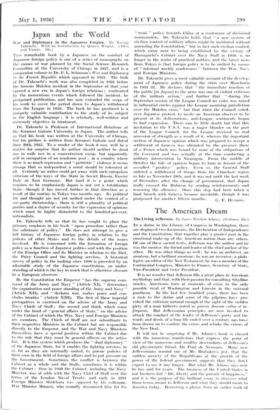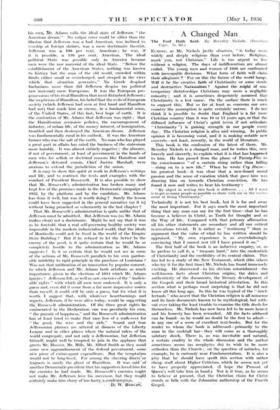The American Dream
The Living Jefferson. By James Trusluw Adams. (Scribner. 154.)
IN a shrine in the Library of Congress in Washington, there
are displayed two doe mts, the Declaration of Indepe'ndenc'e and the Constitution, that together play a greater part in the emotional make-up of the American nation than any others. Of one of these sacred texts. Jefferson was the author and he was the mentor, the friend and leader of the chief author of the other. He was other things as well ; he was an architect, an amateur, but a brilliant amateur; he was an inventor; as philo- logist; an editor of the New Testament; he was a member of the Continental Congress, Minister to France, Secretary of State, Vice-President and twice President.
It is no wonder that .Jefferson fills a great plum in American mythology and that, with their passion for consulting Sibylline oracles, Americans turn at moments of crisis to the only possible rival of Washington and Lincoln in the national pantheon. In the last few troubled years, there has been a rush to the shrine and some of the pilgrims have pro- voked the criticism natural enough at the sight of time sudden piety of a man hitherto noted as prams deorum rubor el in- frequens. But Jeffersonian principles arc now invoked to attack the conduct of the leader of Jefferson's party and the words and deeds of a long life ended over a century ago have been drawn on to confute the errors and rebuke the crimes of the New Deal.
It will not be surprising if Mr. Adams's book is classed with the numerous manifestoes that express the point of' view of the numerous and wealthy descendants of Jefferson's old physiocratic friend, Du Pont de Nemours. Many new Jeffersonians remind one of Mr. Brubaker's jest, that the sudden anxiety of the Republicans at the growth of the power of the federal government suggests that they don't expect to use it any longer. But what Mr. Adams says now he has said for years. The business of the United States is not business but " life, liberty and the pursuit of happiness," and it is the purpose. of his brilliant essay to discover what those terms meant to Jefferson and what they should Mean to -America today. Borrowing a phrase from an ,:arlier work of his own, Mr. Adams calls the ideal state of Jefferson ." the American dream." No. vulgar error could be sillier than the illusion that Jefferson was a bad American, was inclined to worship at foreign shrines, was a mere doctrinaire theorist: Jefferson was , a 100 per cent. American ; he was, if it is possible, a 110. per cent. American. The ideal political State was possible only in America because men were the raw material of the ideal State. "Before the establishment of the American States, nothing was known to history but the man of the old world, crowded within limits either small or overcharged, and steeped in the vices which" that situation generates." No Greek despised barbarians more than did Jefferson despise (as political raw material) mere Europeans. Itmost the European pre- possessions of his rival Hamilton that Most disturbed Jefferson ; the scepticism of Hatnilt i ill, his belief that the evils of European society (which Jefferson had seen at first hand and Hamilton had not) that made him an enemy, in a fundamental senrie; of the United States, of this last, best hope of earth. It is the contention of Mr. Adams that Jefferson was right ; that the Hamiltonian economic policies, the encouragement of industry,. of urban life, of the money interest, of immigration,- troubled and then destroyed the American dream. Jefferson was fundamentally rural in his outlook. It was the American fanner who was the salt of the earth. No man who has played a great part in affairs has rated the business of the statesman more humbly. It was almost entirely negative ; the absence, if not of government, at least of government in the hands of inert who for selfish or doctrinal reasons like Hamilton and Jefferson's detested cousin, Chief Justice Marshall, were anxious to extend the jurisdiction of the union. •
It is easy to show this spirit at work in Jefferson's writings and life,•and to contrast the texts and examples with the conduct of President Roosevelt. It is also possible to show that Mr. Roosevelt's administration has broken many and kept few of the promises made in the Democratic campaign of 193:3, by the platform and by the candidate. Mr. Adams has done it well, but was it worth doing ? Surely the lesson could have been suggested in the general narrative (as it is) without being preached so vehemently in the last Chapter ?
That Mr. Roosevelt's administration is quite unlike that of Jefferson must be admitted. But Jefferson was (as Mr. Adams makes clear) not a doctrinaire. Might he not say that it was as he foretold, that a real self-governing healthy society was impossible in the modern industrialised world, that- the ideals of Monticello could not be lived in the world of the Empire State Building ? But if he refused to let the better be the enemy of the good, is it quite certain that he would be so coMpletely hostile to the administration as Mr. Adams suggests ? Is it so certain that he would not see in some of the actions of Mr. Roosevelt parallels to his own pardon- able infidelity to rigid principle in the purchase of Louisiana ? Was not that ratification of an innovation by popular consent, to which Jefferson and Mr. Adams both attribute so much importance, given in the elections of 1934 which Mr. Adams ignores ? Jefferson felt, as well as saw, enemies of the " inalien- able. rights " with which all men were endowed. It is only and, even did it come from a far more impressive source thrill myself, it could still be only a guess, but for what it is worth I suggest that. with whatever hearthurnings and regrets, Jefferson, if he were alive today, would be supporting tlie, Roosevelt administration. Of the three great rights he enumerated in the Declaration, one was peculiarly his own,
the pursuit of happiness," and the Roosevelt administration has at least tried to make that race less of a walk-over for
the good, the wise and the rich." Sound and true .Iffersoniam phrases are uttered at dinners of the Liberty League and in other places where the natural rnilers of the world congregate, and not only a Jeffersonian, but Jefferion hithself, might well be tempted to join in the applause that greets Mr. Hoover, Mr. Mills, Mr. Alfred Smith as they assail some new aggrandisement of the federal government, some new piece of extravagant expenditure. " But the temptation Would not be long-lived. For among the cheering diners...or leaguers is surely the ghost of Hamilton.. It Was saieof another Democratic president that his supporters loved him for the enemies he had made. Mr. Roosevelt's enemies might not make Mr. Jefferson love his successor, but they would
certainly make him chary of too hasty ,a condeumntign., . .
- w.--Bitedr;t:















































 Previous page
Previous page